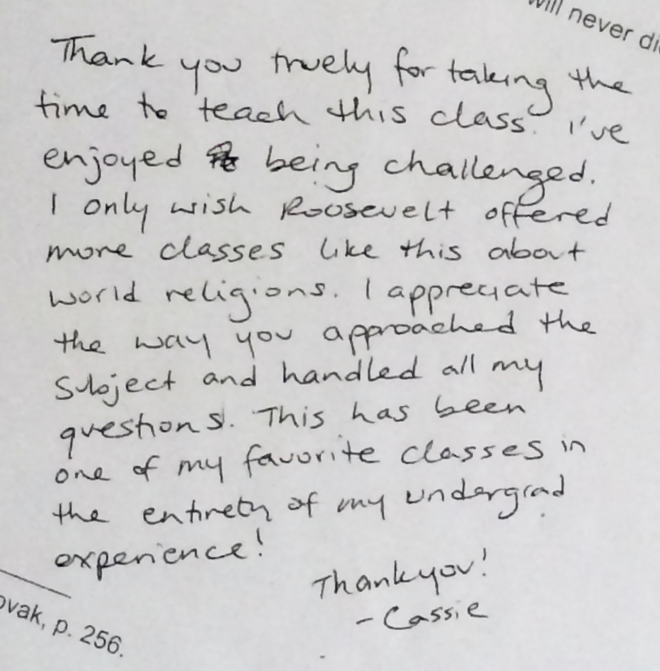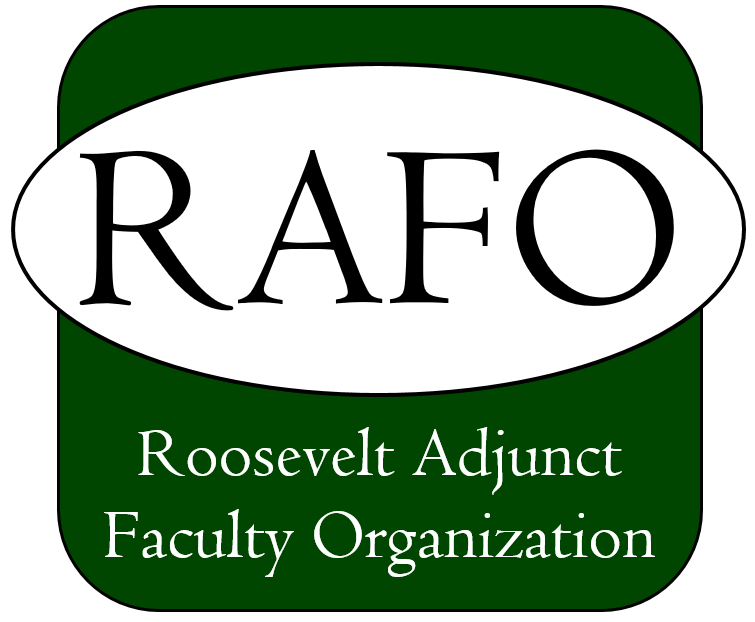The 2016-17 school year has officially ended. Congratulations to those members who completed classes through Roosevelt’s struggles, and through its restructuring, which should be mostly in place for the 2017-18 school year. The school will be selling buildings, restructuring colleges, and working to stabilize and grow undergraduate, transfer, and graduate enrollments. RAFO can confirm that very early indications seem positive: there has been an increase in enrollment for the summer term, the first at Roosevelt since 2008. And first indications are that there will be an overall increase in enrollments for the Fall, though those numbers will not be firm until the semester opens.
But first, summer – and summer will be busy. Next week, RAFO will begin full negotiations with Roosevelt on a new contract. The administration has told RAFO leaders that RU will be relying on adjuncts through the school’s restructuring, and has repeatedly assured us that adjuncts are important and valuable for the future of the school. RAFO intends to make the administration live up to those assurances with a contract that increases adjunct opportunities for stability within Roosevelt, resources to make adjuncts better instructors and researchers, and a wage that matches the rhetoric of value that the administration has spoken of.
As the summer term begins, we at RAFO will reach out to those of you who are teaching, to make sure you are getting the support you need and find out what you still need. We are also asking all RAFO members to stay in touch with the leadership as negotiations continue. Those who want to stay informed should like RAFO’s Facebook page (https://www.facebook.com/RAFO1920/) and Twitter feed (@RAFO1920) for news about Roosevelt as well as other issues of interest to those of us concerned with adjuncts and higher education.
See you this summer,
The Officers of RAFO

I’ve taught off and on (more off, lately) at Roosevelt since the fall of 1997 – nearly twenty years now. During that time I’ve taught Business Ethics, Technology and Human Values, Logic, Existentialism, and World Religions.
One of my students from the World Religions class I taught during the fall 2013 term wrote me a very kind and generous thank you note (written on the back of her 100 question multiple choice final exam). And when she wrote, “I’ve enjoyed being challenged,” she struck gold in this old curmudgeon’s heart.
The name of the game in higher education is retention, retention, retention. One of any college’s most intensive (and expensive) tasks is courting its first year students, persuading them to stay on and earn their degree from Alma Mater U. (and, hopefully, become future Alma Mater donors). To retain students, many colleges sell the college “experience” at the expense of the college education. For those being courted, faculties need to keep rigorous expectations to a minimum.
Adjuncts (more than full time faculty) face being gored on the horns of this dilemma: do you expect less of your students (and that’s ok)? Or do you set the bar high for them (but risk getting fired)? Luckily, this dilemma has a marvelous corollary: Do you teach to live? Or do you live to teach?
Let’s call it the passion corollary. If you teach to live, teaching is not your passion. If you live to teach, that is, if you know that your life would be less enjoyable, less challenging, more boring, and more mundane if you cannot teach, then I have some very bad news – you, my friend, are a teacher.
No one gets from the old to the new without doing some heavy duty stretching. When you don’t challenge your students, you let them down – because you don’t think they can do it. I always love the line from Robert Browning: “Ah, but a man's reach should exceed his grasp / Or what's a heaven for?” ("Andrea del Sarto", line 98). Exactly.
I was honored to serve as the lone RAFO delegate to the Illinois Education Association Representative Assembly held in Chicago from March 30th through April 1st. First, a shoutout to my friend and RAFO colleague Bonnie Smothers. Bonnie actually received more membership votes than I did to serve as delegate, but she was unable to attend and I had the opportunity to serve as her successor.
The 3-day Assembly was energized with almost 1,000 educators, support staff, and retired IEA members statewide. During the first morning of the Conference, we were starkly reminded by the IEA staff attorney and by the IEA staff lobbyist of the existential threats that we as educators face, both from Springfield and from Washington. Higher Ed in particular is under attack, as potential legislation and court decisions threaten our right to organize for the purpose of collective bargaining. Fortunately for RAFO members, our own Beverly Stewart, one of my mentors and a tireless advocate for Higher Ed, is the head of the Higher Education section of the IEA. The Higher Ed section (about 40-45 of us) had a productive and inspiring working lunch session, in which Beverly outlined some of the ways in which we can become more active, involved, and vocal advocates on political issues relating to Higher Ed.
Some of the Conference was devoted to administrative issues, like the election of directors, and of new officers, including President. IEA's president-elect, Kathy Griffin, like her predecessor Cinda Klickna, is a true and loyal friend of and advocate for issues unique to Higher Ed. She has often "rolled up her sleeves" and marched alongside Higher Ed advocates, and we know that she will "have our backs" during her term as President.
The administrative issue voted on at the Conference that will have the most direct impact on us, is the difficult decision to raise membership dues $5 per year this coming fiscal year, and an additional $10 the following year. There was spirited and emotional debate on this budgetary issue, which also included substantial staff and other administrative cuts. In the end, the majority of delegates agreed that the increases were necessary to fund advocacy campaigns, and to fund the pension system. With the financial interests of adjuncts at heart, Beverly proposed several successfully-passed resolutions that directed the IEA Board to consider a "tiered" dues structure based upon income, which would provide relief to our many contingent faculty members who may only teach 1-2 classes per year at Roosevelt (if that), for whom the burden of union dues hits the hardest.
It is crucial that we RAFO members have unconditional support from our "parent" organization. I came away from the Conference confident that we do. In my own mind, and I hope in yours, we are getting a very tangible "bang for our buck" by the dues we pay to the IEA. We urge you become more active with RAFO.
Respectfully submitted,
Michael W. Pinsof, Adjunct Instructor, Paralegal Studies Dept.
Dear RAFO members,
As this tumultuous school year winds down, RAFO held its regular semester meeting with President Malekzadeh and Provost Becker. Using the questions that RAFO members submitted (thank you!), we received updates on what can properly be called the restructuring of Roosevelt in the wake of its budget crisis and the various pressures RU (along with most other universities) faces in the coming years. This is what RAFO knows as of this moment:
- Roosevelt will look very different in 2-3 years. Its share of University Center has already been sold. The Gage Building will likely be put on the market as all programs at Gage will be moved to the Auditorium and Wabash buildings by August. Several floors of dormitories will be converted to offices, and programs will be consolidated and eliminated to reflect a school with an enrollment goal of 5,000 students rather than 8,000+ students.
- Ironically, this downsizing will mean that RU will be leaning on adjuncts more than they already have. A program of early retirement packages being offered to tenured professors and long-time administrators will be followed at the end of the school year by reductions in full-time teacher positions that will not be filled until the budget and enrollment stabilizes. What this should mean for RAFO members is that sections may open up for the 2017-18 semester.
- Further changes will be coming, including Monday-Wednesday-Friday courses for undergraduates (not expected to start until Fall 2018 at the earliest), online classes that will become 8- or 16- week sessions, more evening/Saturday courses (assuming adult and transfer enrollments rise), and eliminated/restructured majors and programs (concurrent with a review and revamping of general education requirements by the Fall of 2018).
All of this is in RAFO’s minds as we begin negotiations on a new contract this summer. RAFO was (and remains) willing to extend the current contract for a year, but the administration insisted that any changes to the contract be negotiated with the full contract in mind. RAFO has been ready to negotiate, so we will head to the table and keep you up to date on the progress. In exchange, we continue to ask that you communicate with us so we are clear as to what you want this contract to represent for you and your work at Roosevelt.
For those of you who wish to keep track of all developments, RAFO recommends you read the daily Broadcast. Additionally, all Senate meetings (and many other governance meetings such as AAUP) are accessible via the Zoom web app and program, available to all adjuncts. Finally, opportunities exist to work with RAFO to stay updated and contribute as the changes ensue. (There will be more on that final point in future communications.)
If you have a class, good luck with the rest of your semester. If you wish to have a class this fall, tell your department chair NOW so you are included in their planning. As always, stay in touch with RAFO. This will be a working summer.
In solidarity,
Joseph Fedorko and the Officers of RAFO, IEA/NEA
RAFO Members,
The Executive Committee invites you to join us for our Spring Membership Meeting, on Thursday, April 6, from 4 - 6 pm in room 825 of the Auditorium Theatre building. We will discuss Roosevelt's restructuring, its impact on adjuncts in the 2017-18 school year, and our upcoming contract negotiations. Light refreshments will be served. We want to hear from you and can use your help - find out how on April 6.
In solidarity,
The Executive Committee of RAFO
P.S. "Like" us on Facebook & Follow us on Twitter to stay up-to-date with news and events!
Page 30 of 31

